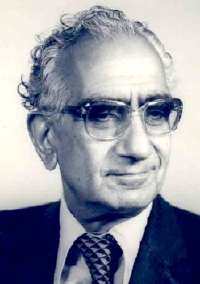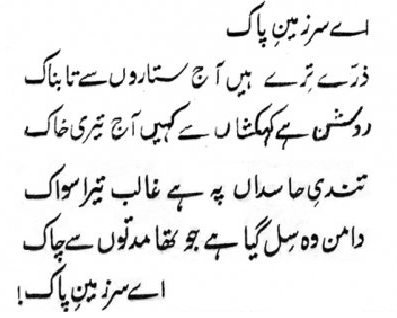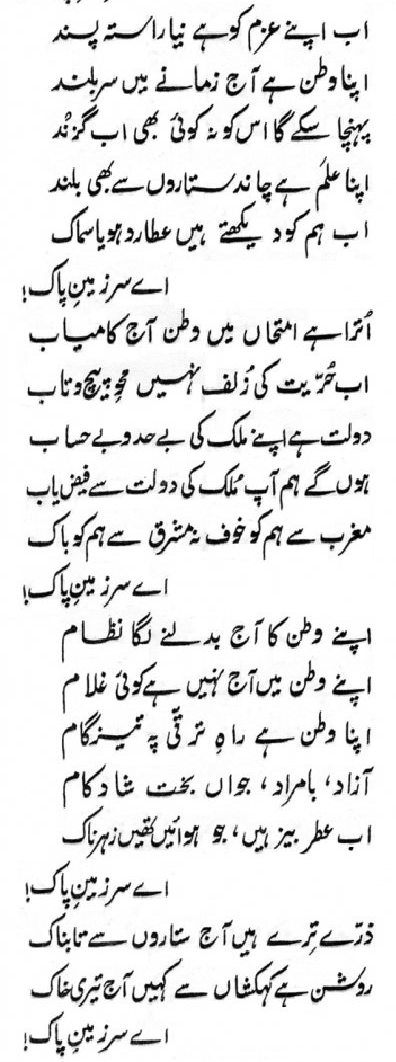Adil Najam
 Back in June 2009 I had first written by Prof. Jagan Nath Azad, who had been asked by the Quaid, Mr. Mohammed Ali Jinnah, to write the very first national anthem of Pakistan. Prof. Azad’s Aé sarzameené paak was, in fact, Pakistan’s first national anthem, until it was later replaced by the current anthem. Prof. Jagan Nath Azad, a Punjabi Hindu, later migrated to India but remained a staunch advocate of Indo-Pakistan friendship (see videos here).
Back in June 2009 I had first written by Prof. Jagan Nath Azad, who had been asked by the Quaid, Mr. Mohammed Ali Jinnah, to write the very first national anthem of Pakistan. Prof. Azad’s Aé sarzameené paak was, in fact, Pakistan’s first national anthem, until it was later replaced by the current anthem. Prof. Jagan Nath Azad, a Punjabi Hindu, later migrated to India but remained a staunch advocate of Indo-Pakistan friendship (see videos here).
At that point I had not been able to find a copy of the full tarana and since then I as well as other readers have been eagerly looking for a copy. Today, reader Adil Mulki found one here and I am delighted to share it with our readers (thanks also to Heritage Online where it was posted; Reader Shahid now alerts me that thanks are also due to ATP friend Beena Sarwar who originally uncovered this via Prof. Azad’s son Chander K. Azad, here):
An English transliteration is provided below for those who cannot read Urdu. I look forward to readers helping out with an actual translation.
Aye sar zameen-i-Pak
Zare tere hain aaj sitaron se tabnak
Roshan hai kehkashan se kahin aaj teri khak
Tundi-e-hasdan pe ghalib hai tera swaak
Daman wo sil gaya hai jo tha mudaton se chaak
Aye sar zameen-i-Pak!Ab apne azm ko hai naya rasta pasand
Apna watan hai aaj zamane main sar buland
Pohncha sake ga is ko na koi bhi ab gazand
Apna alm a hai chand sitaron se bhi buland
Ab ham ko dekhtey hain atarad hon ya samaak
Aye sar zameen-i-Pak!Utra hai imtehan main watan aaj kamyab
Ab huriat ki zulf nahin mahiv-e-paich-o-taab
Daulat hai apne mulk ki be had-o-be hisaab
Hon ge ham aap mulk ki daulat se faiz yab
Maghrib se hum ko khauf na mashriq se hum ko baak
Aye sar zameen-i-Pak!Apne watan ka aaj badalne laga nizam
apne watan main aaj nahin hai koi ghulam
apna watan hai rah-e-taraqi pe tez gam
azad, bamurad jawan bakht shad kaam
ab itr bez hain jo hawain thin zehr naak
Aye sar zameen-i-Pak!Zare tere hain aaj sitaron se tabnak
Roshan hai kehkashan se kahin aaj teri khak
Aye sar zameen-i-Pak!
P.S. Would it not be really wonderful if we could also find an audio recording from when it was the national anthem!





















































Aye sir zameen-i-Pak
Zare tayray hain aaj sitaron say tabnak
Roshan hai kehkishan say ka’hin aaj teri khakk
Tundi-e-hasdan pay hai ghalib tera swaak
Daman wo sill gaya hai jo tha mudat’toon say chaak
Aye sir zameen-i-Pak!
Abb apne aazm ko hai naya rasta pasand
Apna watan hai aaj zamanay main sir buland
Ponhcha sakay ga is ko na koi bhi ab gazand
Apna alam hai chand sitaron say bhe buland
Abb ham ko daykhtay hain atarad ho ya samaak
Aye sir zameen-i-Pak!
Utra hai imtehan main watan aaj kamm’yaab
Abb huriat key zulf nahin mahiv-e-paich-o-taab
Daulat hai apne mulk key bay’hudd-o-bay’hisaab
Hon’gay hum aapp mulk key daulat say faiz’yaab
Maghrib say hum ko khauff na mushriq say hum ko baak
Aye sir zameen-i-Pak!
Apnay watan ka aaj badalnay laga nizam
Apnay watan main aaj nahin hai koi ghulam
Apnay watan hai rah-e-taraqi pay tez’gham
Azad, ba’murad, jawan bakth shad’kaam
Abb ittr bez hain, jo hawain thien zehyr naak
Aye sir zameen-i-Pak!
Zare tayray hain aaj sitaron say tabnak
Roshan hai kehkishan say ka’hin aaj teri khakk
Aye sir zameen-i-Pak!
O’Blessed Land of the Pure
O, Blessed Land of the Pure
Your grains today brighter than stars
Your soil lightened by galaxy of stars
Awe-struck is the enemy by your resilience
Shirtwait now hemmed, which torn since time
O’Blessed Land of the Pure
Our resolve enamored with new direction
Our nation today stands tall admass
No harm will reach it’s extend
Our banner ascends higher than moon and stars
And our witness be Mercury and Mars
O’Blessed Land of the Pure
Today the nation successfully confirmed
Now freedom struggle is bygone
The country’s wealth unlimited and boundless
We will all be blessed by the wealth
Of West no fear, of East no dispute
O’Blessed Land of the Pure
We will transform the polity of our nation
Slave no more in our nation
On the road of progress, swift is our nation
Independent, fortuitous, youthful and joyous
Fragrant are winds which were once poisonous
O’Blessed Land of the Pure
Your grains today brighter than stars
Your soil lightened by galaxy of stars
O’Blessed Land of the Pure
Copyright (c) 2010, Watan Aziz, All Rights Reserved under US Laws and International Treaties for the transliteration and translation of the original works of Dr. Jagan Nath Azad.
Note: You may freely copy but you must acknowledge the copyright owner Watan Aziz and http://www.pakistaniat.com, All Things Pakistan, as the source of the transliteration and the translation.
O, Blessed Land of the Pure
O, Blessed Land of the Pure
Your grains today brighter than stars
Your soil lightened by galaxy of stars
Awe-struck is the enemy by your resilience
Shirtwait now hemmed, which torn since time
O, Blessed Land of the Pure
Our resolve enamored with new direction
Our nation today stands tall admass
No harm will reach it’s extend
Our banner ascends higher than moon and stars
And our witness be Mercury and Mars
O, Blessed Land of the Pure
Today the nation successfully confirmed
Now freedom struggle is bygone
The country’s wealth unlimited and boundless
We will all be blessed by the wealth
Of West no fear, of East no dispute
O, Blessed Land of the Pure
We will transform the polity of our nation
Slave no more in our nation
On the road of progress, swift is our nation
Independent, fortuitous, youthful and joyous
Fragrant are winds which were once poisonous
O, Blessed Land of the Pure
Your grains today brighter than stars
Your soil brightened by the galaxy
O, Blessed Land of the Pure
Translation is a tricky business. The translator has to resist the urge to add meaning to other than the original intent. Poetry is harder than prose because you are mindful of the balance.
No translation is good. If acceptable, it is good enough. This is my rendition. I hope others can improve upon it.
Dr. Jagan Nath Azad, I appreciate your service to the cause of Jinnah. This is an attempt to pay tribute to your efforts.
And a simultaneous rebuke to Liaqat, the original sinner, the decoupler of Jinnah’s vision. It is too obvious when you read this tarana again and again, why it was a thorn in the side of the those who were not interested in equity and justice. And how fast they moved when Jinnah died.
I do like the current tarana. It has a stirring feelings and movements and is lofty. And I take away nothing. But I surely would have kept the sharing of the wealth portions. It would have been a very different Pakistan today.
Nevertheless, there is tomorrow. And tomorrow is the first day for the rest of the times.
Pakistan Zindabad
Pakistan Paindabad
Reference:
http://en.wikipedia.org/wiki/Qaum%C4%AB_Tar%C4%81n a
ATP, minor correction.
Dr. Jagan Nath Azad was not Punjabi, but a Kashmiri, born in Isakhel in Pakistan. And like all Kashmiris, (the great Allam being one of them) will always be know as Kashmiris, no matter where they are born.
A Kashmir will always be a Kashmiri. Place of birth is a minor detail to be ignored. And I am eternally grateful to my mother to giving me the insight on how to spot a Kashmiri! The famous ‘na’ak’!
With that, here is the letter of his son:
From: chander k. azad
Date: Mon, Sep 7, 2009 at 10:23 PM
Subject: info on Dr Jagan Nath Azad
To: beena.sarwar@…
September 6, 2009
Dear Beena ji,
Read with interest your piece (peace) in Kashmir Times Sep., 06,’09 (Neighbours in peace – or pieces?).
Kudos for being an Indian agent. Might console you to know that there are millions of Pakistani agents on this side. Yes, we are agents of humanity, peace and posess no hard feelings !!! only respect and love for all and with an eye on the future. The past is gone. Remember only the good things of the past. Forget the rest. Bury the hatchet.
Your objectivity is what I admire. No taking sides for the sake of it. Heart of it, most of us (detached of political or fanatic cues), are peace loving , humane and gregarious. I hope your mention of Pakistani fallacies is matched by Indians in admitting blunders committed by Indian politicians against Pakistan. You mention Kargil by Pakistan. I say East Pakistan (Bangladesh) by India. Can that be condoned?
You asked me about some biographical details of my father. Dad migrated to Delhi sometime mid-September 1947. But again returned to Lahore in October. However, his friends advised him against staying as they found it difficult to keep him safe due to worsening situation. He returned to Delhi with a refugee party.
He joined “MILAP” (Urdu Daily) as Assistant Editor in November 1947. In 1950 he joined Ministry of Information & Broadcasting as Asstt. Editor (Urdu) Publications Division. Retired in 1977 as Director of Public Relations, Govt. of India, Srinagar, J & K, a key bureaucratic position he held for five years . During this period I was witness to history of the State of J & k being carved and his unchronicled sentinel contribution towards it. The poet in him got the breathing space in 1997 when he retired from Govt. service but was appointed as Professor and Head of Urdu Deptt. , Jammu University by Chief Minister Sheikh Mohd. Abdullah Sahib who candidly told him “ Hum apko Dilli Vapas jaane nahin denge.”
During his lifetime my father authored and published around 73 books. He was recipient of hundreds of national and international awards including:
1. Pakistan President Iqbal Medal (1979),
2. Award of Emeritus Fellowship by Jammu University (1884 Till Life),
3. Iqbal Award-Gold Medal & Citation, Iqbal Academy, Hyderabad (1987),
4. Conferment of the degree of D. Lit. (Honoris Causa)by Kashmir University (1989),
5. Soviet Land Nehru Award (1989),
6. Conferment of the degree of D. Lit. (Honoris Causa)by Jammu University (1994),
7. Conferment of degree of Ph. D on six scholars ‘on the life of Prof. Azad”.
He is known to have visited Universities all over the Orient and the Occident to deliver extension lectures .
If you desire, I can post you a copy of his Biography compiled by Prof. Assadulah Wani, Jammu University. You have to send me your postal address for that.
***His last manuscript (unpublished) “Roodad-e-Iqbal” has this preface by him, I quote,” anything on Iqbal after this has no meaning” The manuscript is with me and I do not know what to do with it.
With regards and best wishes,
Chander K Azad.
108 / 5, Greater Kailash , Jammu,
J & k. -180011
(copied without permission)
Pakistan’s National Anthem
http://en.wikipedia.org/wiki/Qaum%C4%AB_Tar%C4%81n a
The Qaumī Tarāna (Urdu: قومی ترانہ) is the National Anthem of Pakistan. The words “Qaumi Tarana” in Urdu literally translate to “National Anthem”. The Pakistani national anthem is unique in that its music preceded its lyrics. At independence, on August 14, 1947, Pakistan did not have a national anthem. When the flag was hoisted at the independence ceremony it was accompanied by the song, “Pakistan Zindabad, Azadi Paendabad”. The flag itself had only been approved by the Constituent Assembly of Pakistan three days earlier.[1][2][3] Muhammad Ali Jinnah, the founder of Pakistan, asked Lahore-based Hindu writer, Jagannath Azad on August 9, 1947 to write a national anthem for Pakistan in five days.[4][5] The anthem written by Azad was quickly approved by Jinnah, and it was played on Radio Pakistan.[6] Azad’s work remained as Pakistan’s national anthem for approximately eighteen months, despite competition from a rival attempt by B.T. Baghar. The current national anthem of Pakistan was written by a Muslim writer named Abu-Al-Asar Hafeez Jullundhri.
Composition
In early 1948, A. R. Ghani from Transvaal, South Africa, offered two prizes of five thousand rupees each for the poet and composer of a new national anthem. The prizes were announced through a Government press note published in June 1948. In December 1948, a National Anthem Committee (NAC) was formed, initially chaired by the Information Secretary, Sheikh Muhammad Ikram. Committee members included several politicians, poets and musicians such as Abdur Rab Nishtar, Ahmed Chagla and Hafeez Jullundhri. The committee had some difficulty at first in finding suitable music and lyrics.
In 1950, the impending state visit of the Shah of Iran resulted in the Government asking the NAC to submit an anthem without delay. The committee chairman, Federal Minister for Education, Fazlur Rahman, asked several poets and composers to write lyrics but none of the submitted works were deemed suitable. The NAC also examined several different tunes and eventually selected the one presented by Chagla and submitted it for formal approval. Chagla produced the musical composition in collaboration with another committee member and assisted by the Pakistan Navy band.[7]
The music of the anthem was composed by Ahmed Ghulamali Chagla, with lyrics written by Abu-Al-Asar Hafeez Jullundhri. The three stanza composition was officially adopted in 1954. However, the music for the anthem had been composed in 1950 and had been used on several occasions before official adoption. The lyrics allude to a “Sacred Land” referring to Pakistan and a “Flag of the Crescent and Star” referring to the national flag. Unofficially, the anthem is sometimes referred to by its first line “Pāk sarzamīn shād bād” (Urdu: “Blessed be the sacred land”). The national anthem is played during any event involving the hoisting of the flag, for example Pakistan Day (March 23) and Independence Day (August 14).
The anthem without lyrics was performed for Prime Minister Liaquat Ali Khan and later for the National Anthem Committee on August 10, 1950.[8] Although it was approved for playing during the visit of the Shah, official recognition was not given until August 1954.[8] The anthem was also played during the Prime Minister’s visit to the United States. The NAC distributed records of the composed tune amongst prominent poets, who responded by writing and submitting several hundred songs for evaluation by the NAC. Eventually, the lyrics written by Jullundhri were approved and the new national anthem was first played properly on Radio Pakistan on August 13, 1954.[9] Official approval was announced by the Ministry of Information and Broadcasting on August 16, 1954. The composer Chagla had however died in 1953, before the new national anthem was officially adopted. In 1955 there was a performance of the national anthem involving eleven major singers of Pakistan including Ahmad Rushdi.[10]
Aye sir zameen-i-Pak
Zare tayray hain aaj sitaron say tabnak
Roshan hai kehkishan say ka’hin aaj teri khakk
Tundi-e-hasdan pay hai ghalib tera swaak
Daman wo sill gaya hai jo tha mudat’toon say chaak
Aye sir zameen-i-Pak!
Abb apne aazm ko hai naya rasta pasand
Apna watan hai aaj zamanay main sir buland
Ponhcha sakay ga is ko na koi bhi ab gazand
Apna alam hai chand sitaron say bhe buland
Abb ham ko daykhtay hain atarad ho ya samaak
Aye sir zameen-i-Pak!
Utra hai imtehan main watan aaj kamm’yaab
Abb huriat key zulf nahin mahiv-e-paich-o-taab
Daulat hai apne mulk key bay’hudd-o-bay’hisaab
Hon’gay hum aapp mulk key daulat say faiz’yaab
Maghrib say hum ko khauff na mushriq say hum ko baak
Aye sir zameen-i-Pak!
Apnay watan ka aaj badalnay laga nizam
Apnay watan main aaj nahin hai koi ghulam
Apnay watan hai rah-e-taraqi pay tez’gham
Azad, ba’murad, jawan bakth shad’kaam
Abb ittr bez hain, jo hawain thien zehyr naak
Aye sir zameen-i-Pak!
Zare tayray hain aaj sitaron say tabnak
Roshan hai kehkishan say ka’hin aaj teri khakk
Aye sir zameen-i-Pak!
This is my rendition.
As there is no standard on transliteration, I tried to make it as close to the sound as possible and fixed a few minor transpositions.
A gratitude for Jagan Nath Azad.